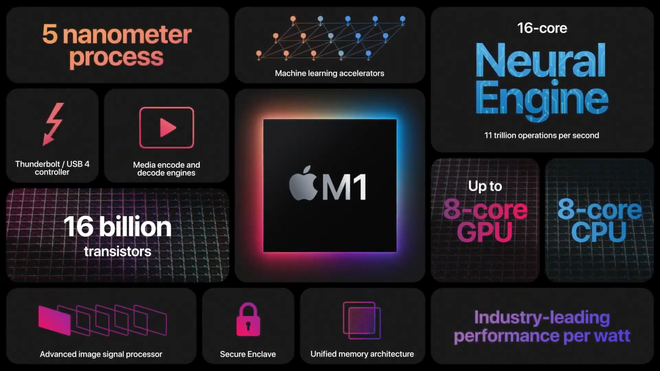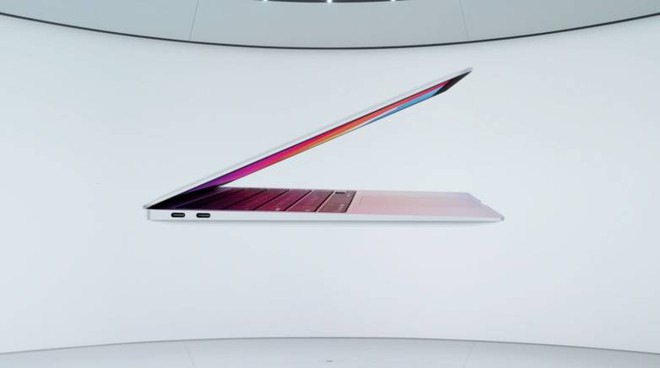Apple wants to 'tie up' users with both software and hardware
Apple has always touted its computers like super cars, with great design impressions while promising excellent performance that makes it easy to get things done. Now, with the switch to homegrown chips, Apple is hoping to continue to entice users with the ability to control their hardware and software.
Last week, Apple began allowing users to pre-order the new $ 999 MacBook Air laptop and the $ 1,199 MacBook Pro laptop, as well as the $ 699 Mac Mini desktop with the new chip. The company says the new computers have met Apple's standard every upgrade cycle to become one of the fastest portable personal computers in the world. Even more attractive is their battery life is now getting better while not using the fan (in the MacBook Air model).
All of those changes come from the company's new M1 silicon chip that uses a dedicated ARM architecture for Mac computers, Apple says. So, after 14 years of reliance on Intel processors, Apple is now able to remove the thing it has no control over from its computing ecosystem and continue to increase its ability to 'self-produce.' 'my hardware.
To get the M1 chip, Apple spent more than a decade research and development and spent at least $ 1 billion acquiring half a dozen related companies to optimize and produce a powerful processor for the machine. calculation, based on the A-Series chips for their iPhone and iPad. Apple says the M1 now not only competes with Intel's microprocessors in the PC market, but also a counterweight to Intel.
According to CNET, Apple's move to refresh computers follows its longstanding trend of gaining more and more control over both the device and the components that power them. Apple has made custom chips for security, such as with Face ID and Touch ID unlocking features. It is also created with custom image processing chips, to optimize photos taken on iPhone.
Apple also creates iOS and iPadOS software to create exclusive customizations for its devices, allowing them to fine-tune the hardware and software for those devices. 'The (Apple) innovations directly hit buyers' current deep concern, namely performance and battery life, '' said Ross Rubin, an analyst at Reticle Research.
Increased strength

Apple claims that the new MacBooks use the M1 chip that is 98% more powerful than other Windows laptops
Apple's efforts to make nearly every part of the device on its own have made it one of the largest phone makers in the world. Likewise, its App Store has become a hub of innovation for the tech industry, though Apple already has strict control over the behavior and content of the apps provided above. Additionally, iPhone and iPad owners can only download apps from Apple's App Store, another form of control that other companies don't use, like Google and the Google Play store competing for devices. powered by their Android software.
Despite the Apple squeeze, the App Store has thrived. Apple says it counts more than a billion iPhones in use today, and many of those customers are more willing to pay for software than those who own other devices.
As a result, the App Store helped spawn companies like social network TikTok, ride-hailing giant Uber and photo-sharing service Instagram, acquired by Facebook in 2012 for $ 1 billion. Apple says its research shows the App Store helped facilitate more than $ 500 billion in trade surpluses last year.
However, not everyone believes that Apple's approach will work all the time.
Device control
Apple says ditching the Intel chip will take about two years, and it will continue to support Mac computers running the chip for a long time. It is clear that the tech industry will follow Apple, even though its computers will have only 7.4% of the global market share in 2019, according to IDC data.
When Apple made major changes to its computers by integrating a webcam into the MacBook Pro in 2006 or developing an ultra-thin chassis for the MacBook Air in 2008 and pushing out a screen with "retina" resolution. on the 2015 MacBook Pro, other computer makers followed suit. Today's PC laptops have largely removed the bulky plastic from a decade ago, evolving into thin designs similar to metal cases. Sometimes, they're even known for borrowing Apple ideas so much that at first glance you think it's a MacBook.

The major announcements around the Apple M1 chip are based on the ARM architecture
With the new Mac computer, Apple's foray into the industry isn't just about new materials or adding peripherals, like better speakers or a new kind of fingerprint sensor, that other manufacturers can buy and add to their product. By redesigning the inside of the machine, Apple is creating custom parts that few companies have the resources to do.
Patrick Moorhead, an analyst at Moor Insights and Strategy, and former chief executive officer at chipmaker AMD, said. 'This is really hard work, major PC makers like Dell and HP will need to focus more on how their software works and take a closer look at the type of hardware they put into their computers. People will have to take silicon more seriously. "
To be sure, some companies have started using mobile chips to power their computers. Most notably, in 2012, Microsoft tried to sell the Surface RT, a tablet-laptop hybrid powered by a mobile chip made by Nvidia. But the device can't run many standard apps and only uses a custom version of Windows RT, which results in a lot of limitations. This cost Microsoft at a cost of $ 900 million on Windows RT computers that existed a year later.
In 2019, Microsoft started a new effort, this time with the $ 999 Surface Pro X with a chip it designed with Qualcomm. Experts say its design and capabilities are much better this time, though still unable to run popular applications like Adobe Photoshop.

Apple is gradually perfecting the ability to take complete control of their computers
Apple is avoiding those problems by partnering with developers like Microsoft and Adobe, as well as smaller developers, to help them rework their apps to take advantage of the new chip. They also built a feature for their new Macs called Rosetta, which makes popular applications, including those created by Adobe, run smoothly on the new device. Apple hasn't listed all the apps it has tested, but there are suggestions that most popular apps should work.
All of that could put Apple ahead of other computer makers when they make the same transition. Apple CEO Tim Cook said 'these big advances have only come from making bold changes. This is exactly why we're moving Macs to Apple's silicon. 'But besides that, everyone knows for sure that Apple really only has peace of mind when it comes to controlling everything on their devices, especially. Mac computer microprocessor.